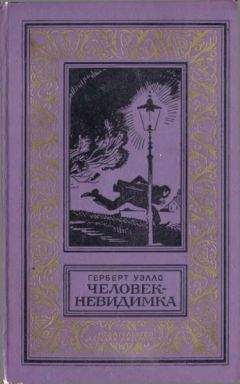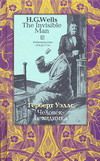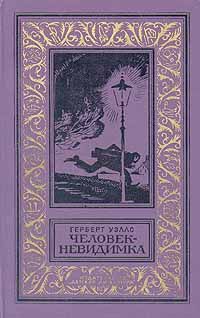H. Wells - Английский язык с Г. Уэллсом "Человек-невидимка"
guessed [gest], furniture [`fq:nICq], mother [`mADq]
“’Tas sperits,” said Mrs. Hall. “I know ’tas sperits. I’ve read in papers of en. Tables and chairs leaping and dancing...”
“Take a drop more, Janny,” said Hall. “’Twill steady ye.”
“Lock him out,” said Mrs. Hall. “Don’t let him come in again. I half guessed — I might ha’ known. With them goggling eyes and bandaged head, and never going to church of a Sunday. And all they bottles — more’n it’s right for any one to have. He’s put the sperits into the furniture.... My good old furniture! ’Twas in that very chair my poor dear mother used to sit when I was a little girl. To think it should rise up against me now!”
“Just a drop more, Janny (/выпей/ еще немного, Дженни),” said Hall. “Your nerves is all upset (твои нервы совсем расстроены).”
They sent Millie across the street through the golden five o’clock sunshine (они послали Милли /в дом/ напротив через золотистый пятичасовой солнечный свет = было пять часов, солнце ярко заливало улицу, когда они послали Милли в /дом/ напротив; to send) to rouse up Mr. Sandy Wadgers, the blacksmith (разбудить мистера Сэнди Уоджерса, кузнеца). Mr. Hall’s compliments (/Милли сказала/ мистер Холл кланяется вам; compliment — любезность, комплимент; compliments — поклон, наилучшиепожелания) and the furniture upstairs was behaving most extraordinary (/и что/ мебель наверху ведет себя чрезвычайно странно). Would Mr. Wadgers come round (не зайдет ли /к ним/ мистер Уоджерс; tocomeround— заходить /ненадолго/; заглянуть /навестить кого-нибудь/)? He was a knowing man, was Mr. Wadgers (он был человеком смышленым/знающим), and very resourceful (и очень находчивым; resource — ресурс; способ, средство; изобретательность, находчивость; умение выходить из трудного положения). He took quite a grave view of the case (он весьма серьезно отнесся к этой истории; totakeaviewof— относиться определенным образом к чему-либо).
“Arm darmed if thet ent witchcraft (будь я проклят, если это не колдовство; Armdarmedifthetentwitchcraft= I'mdamnedifthatisn'twitchcraft; witchcraft: witch— колдунья, ведьма; craft— ремесло, профессия; умение),” was the view of Mr. Sandy Wadgers (таким было мнение мистера Уоджерса). “You warnt horseshoes for such gentry as he (вам нужны подковы для такого парня, как он = ему только копыт не хватает; warnt= want; horseshoe— подкова: horse— лошадь; shoe— туфля, башмак; gentry— джентри, нетитулованное мелкопоместное дворянство).”
compliment [`kOmplImqnt], furniture [`fq:nICq], resourceful [rI`zLsf(q)l]
“Just a drop more, Janny,” said Hall. “Your nerves is all upset.”
They sent Millie across the street through the golden five o’clock sunshine to rouse up Mr. Sandy Wadgers, the blacksmith. Mr. Hall’s compliments and the furniture upstairs was behaving most extraordinary. Would Mr. Wadgers come round? He was a knowing man, was Mr. Wadgers, and very resourceful. He took quite a grave view of the case.
“Arm darmed if thet ent witchcraft,” was the view of Mr. Sandy Wadgers. “You warnt horseshoes for such gentry as he.”
He came round greatly concerned (он пришел, сильно озабоченный). They wanted him to lead the way upstairs to the room (они хотели, чтобы он поднялся наверх, в ту комнату; to lead the way — идти впереди; показывать дорогу), but he didn’t seem to be in any hurry (но, казалось, он вовсе не спешил /с этим/). He preferred to talk in the passage (он предпочел говорить в коридоре). Over the way Huxter’s apprentice came out (/из лавки/ напротив вышел помощник Хакстера; apprentice — ученик, подмастерье) and began taking down the shutters of the tobacco window (и стал снимать ставни с окна табачной /лавки/). He was called over to join the discussion (его пригласили присоединиться к обсуждению /случившегося/; tocallover— делать перекличку; отвлекать /внимание/). Mr. Huxter naturally followed over in the course of a few minutes (естественно, вслед за ним подошел сам мистер Хакстер через несколько минут; in the course of — втечение). The Anglo-Saxon genius for parliamentary government asserted itself (здесь проявился англосаксонский парламентский дух; parliamentary government — парламентская форма правления; to assert — утверждать, заявлять; отстаивать/права/); there was a great deal of talk and no decisive action (говорили много, но решительных действий не предпринимали; a great deal of — много, значительноеколичество; decisive action — решительныедействия).
“Let’s have the facts first (сначала установим факты),” insisted Mr. Sandy Wadgers (настаивал мистер Сэнди Уоджерс). “Let’s be sure we’d be acting perfectly right in bustin’ that there door open (нужно убедиться, что мы поступим совершенно правильно, если взломаем ту дверь; bustin’ = busting; to bust — сломать/ся/, взломать). A door onbust is always open to bustin’ (невзломанную дверь всегда можно взломать; onbust = unbust; open — открытый; доступный, подверженный), but ye can’t onbust a door once you’ve busted en (но нельзя сделать дверь невзломанной, раз взломав ее; ye = you).”
apprentice [q`prentIs], course [kLs], genius [`GJnIqs], parliamentary ["pRlq`ment(q)rI], government [`gAv(q)mqnt]
He came round greatly concerned. They wanted him to lead the way upstairs to the room, but he didn’t seem to be in any hurry. He preferred to talk in the passage. Over the way Huxter’s apprentice came out and began taking down the shutters of the tobacco window. He was called over to join the discussion. Mr. Huxter naturally followed over in the course of a few minutes. The Anglo-Saxon genius for parliamentary government asserted itself; there was a great deal of talk and no decisive action.
“Let’s have the facts first,” insisted Mr. Sandy Wadgers. “Let’s be sure we’d be acting perfectly right in bustin’ that there door open. A door onbust is always open to bustin’, but ye can’t onbust a door once you’ve busted en.”
And suddenly and most wonderfully (внезапно и удивительно = вдруг ко всеобщему удивлению) the door of the room upstairs opened of its own accord (дверь комнаты наверху открылась сама по себе), and as they looked up in amazement (и, взглянув с изумлением наверх), they saw descending the stairs the muffled figure of the stranger (они увидели спускавшуюся по лестнице закутанную фигуру незнакомца) staring more blackly and blankly than ever (пристально смотревшего как никогда сердито и неотрывно; blackly — мрачно, сердито; blankly — безучастно; невыразительно, тупо) with those unreasonably large blue glass eyes of his (своими чрезмерно большими синими стеклянными глазами = через свои огромные синие очки; unreasonable — неразумный; неумеренный, чрезмерный; необоснованный). He came down stiffly and slowly (он медленно, деревянной /походкой/ спустился; stiff — жесткий, негибкий; одеревенелый), staring all the time (все время пристально глядя /на них/); he walked across the passage staring, then stopped (прошел по коридору, затем остановился).
“Look there (смотрите)!” he said, and their eyes followed the direction of his gloved finger (сказал он, и их взгляды последовали в направлении его пальца в перчатке = они посмотрели в указанном направлении) and saw a bottle of sarsaparilla hard by the cellar door (и увидели бутылку с сарсапарелью у двери погреба; hard by — близко, рядом). Then he entered the parlour (потом он вошел в гостиную), and suddenly, swiftly, viciously (и внезапно, быстро и злобно; vicious — порочный, дурной; злой, злобный), slammed the door in their faces (захлопнул дверь перед самым их носом).
accord [q`kLd], descending [dI`sendIN], viciously [`vISqslI]
And suddenly and most wonderfully the door of the room upstairs opened of its own accord, and as they looked up in amazement, they saw descending the stairs the muffled figure of the stranger staring more blackly and blankly than ever with those unreasonably large blue glass eyes of his. He came down stiffly and slowly, staring all the time; he walked across the passage staring, then stopped.
“Look there!” he said, and their eyes followed the direction of his gloved finger and saw a bottle of sarsaparilla hard by the cellar door. Then he entered the parlour, and suddenly, swiftly, viciously, slammed the door in their faces.
Not a word was spoken (ни слова не было произнесено = никто не сказал ни слова; to speak) until the last echoes of the slam had died away (пока не затихли последние отзвуки = звук захлопнутой двери; slam — хлопанье/обычнодверьми/; to die away — постепенноослабевать, затихать/оветре, звуке/). They stared at one another (они уставились друг на друга).



